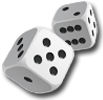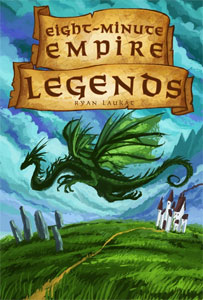



play board games
Board game reviews, strategy tips & session reports
Eight-Minute Empire: Legends Review
 Stats:
Stats:
No. of players: 2-4
Amount of time to play: 15-30 min
Age requirements: 8+
Set-up time: minimal
Eight-Minute Empire: Legends is a reworked version of Eight-Minute Empire, released on Kickstarter last year. This version has a fantasy theme and some tweaks that make it a similar game with a few distinctions.
This guest review was written by Jeff Quick.
Eight-Minute Empire: Legends Rules Description:
Each player begins with nine coins and four armies in the same starting zone on the world map.
A deck contains 35 cards, six of which are laid out in a line the top of the map. Each turn, a player takes the card at the front of the line for free or pays one to three coins for a card further down the line.
The top of the card grants you an ability (such as “place an extra army when you place armies” or “gain two coins”) or potential victory points (VP). The bottom of the card grants you an action (Such as “move three armies” or “build a city”) which you take immediately.
Then slide cards down to fill in the gap and turn over a new card from the deck at the end of the line.
The game ends when a set number of cards has been taken by each player (based on the number of players). All players then tally up victory points based on territories claimed, card abilities, or other special conditions.
The game usually takes longer than its titular eight minutes, but less than a half hour, even for first-timers.
Quick Review of Eight-Minute Empire: Legends:
Eight-Minute Empire: Legends is a tight little area control game. Your choices are simple, but not necessarily easy. Each turn you weigh options for putting new armies on the board, moving armies to claim new territory, and gaining VP for the kind of cards you collect. The winner will balance these three goals best in a limited number of turns.
Luck influences your ability to finish things you start—sometimes the cards you need just don’t come up, or get snatched by another player before you get them. But the focus is more on making do with what you get, rather than playing a perfect or perfectly awful card selection.
To play well, you need an ample understanding of the cards and choices associated with them. This isn’t difficult, since there are only 35 of them, and they break down into a handful of point-scoring sets. For instance, you might decide to collect “Dire” cards to try for Dire set VP at the end of the game. But if you don’t get the one card that grants you VP for collecting Dire cards, your set scores nothing. The cross-section of abilities that grant you VP requires you to pick a strategy early and stick with it. Meanwhile, you need to keep in mind that the abilities of the cards you choose might not correspond with the actions you need to take. This can lead to some on-the-fly point calculation which slows the game down a little.
The game comes with a couple of variants, which experienced gamers should just always play with. The complexity adds interest without bogging anything down.
Interaction mostly comes through card denial. Despite moving armies on the map, a limited number of cards allow you to affect another player’s armies, and then only minimally. To affect another player, you must either outnumber that player in a given territory or take the card you can see that he or she wants. Of course, you might pass up a card you need when you do that!
The art is lovely, colorful and evocative of a fantastic world. If you are a fan of art, you might love this game just for the look.
I normally dislike the term “filler” for a game. However, Eight-Minute Empire: Legends seems to be the sort of game that experienced gamers could play twice and feel done with unless they enjoy it as a filler. It would be a good game to play before everyone arrives. It’s a little too “gamey” for non-gamers to just jump into, but it’s simple enough that an open-minded non-gamer could pick it up. I probably wouldn’t try it with kids under 10.
If you want a gorgeous light, quick game, give it a shot.
Score and synopsis: (Click here for an explanation of these review categories.)
Strategy 5 out of 6
Luck 4 out of 6
Player Interaction 4 out of 6
Replay Value 3 out of 6
Complexity 4 out of 6
Fun 4 out of 6
Overall 4 out of 6

Leave a Reply